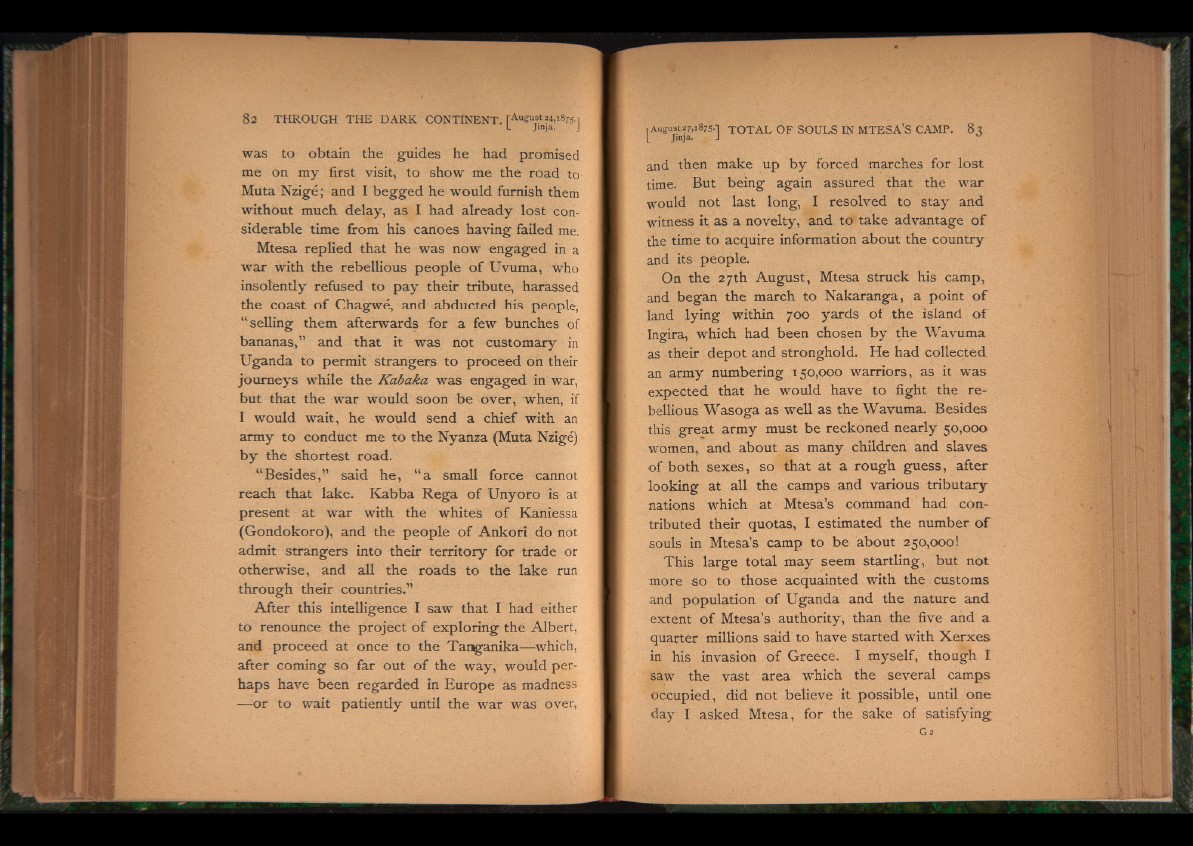
was to obtain the guides he had promised
me on my first visit, to show me the road to
Muta Nzigé; and I b eg g ed he would furnish them
without much delay, as I had already lost considerable
time from his canoes having failed me.
Mtesa replied that he was now engaged in a
war with the rebellious people o f Uvuma, who
insolendy refused to p a y their tribute, harassed
the coast o f Chagwé, and abducted his people,
“ selling them afterwards for a few bunches of
bananas,” and that it was not customary in
Uganda to permit strangers to proceed on their
journeys while the Kabaka was engaged in war,
but that the war would soon be over, when, if
I would wait, he would send a chief with an
army to conduct me to the Nyanza (Muta Nzigé)
b y the shortest road.
“ Besides,” said he, “ a small force cannot
reach that lake. Kabba Rega o f Unyoro is at
present at war with the whites o f Kaniessa
(Gondokoro), and the people o f Ankori do not
admit strangers into their territory for trade or
otherwise, and all the roads to the lake run
through their countries.”
After this intelligence I saw that I had either
to renounce the project o f exploring thè Albert,
and proceed at once to the Tanganika— which,
after coming so far out o f the way, would perhaps
have been regarded in Europe as madness
— or to wait patiently until the war was over,
,-August37,1875.-1 TOTAL o f s o u l s in m t e s a ’s camp. 83 L Jinja. J 0
and then make up b y forced marches for lost
time. But being again assured that the war
would not last long, I resolved to stay and
witness it as a novelty, and to take advantage o f
the time to acquire information about the country
and its people.
On the 27th August, Mtesa struck his camp,
and began the march to Nakaranga, a point o f
land lying within 700 yards o f the island o f
Ingira, which had been chosen b y the Wavuma
as their depot and stronghold. He had collected
an army numbering 150,000 warriors, as it was
expected that he would have to fight the rebellious
Wasoga as well as the Wavuma. Besides
this great army must be reckoned nearly 50,000
women, and about as many children and slaves
o f both sexe s, so that at a rough guess, after
looking at all the camps and various tributary
nations which at Mtesa’s command had contributed
their quotas, I estimated the number o f
souls in Mtesa’s camp to be about 250,000!
This large total may seem startling, but not
more so to those acquainted with the customs
and population o f Uganda and the nature and
extent o f Mtesa’s authority, than the five and a
quarter millions said to have started with X e rx e s
in his invasion o f Greece. I myself, though I
saw the vast area which the several camps
occupied, did not believe it possible, until one
day I asked Mtesa, for the sake of satisfying